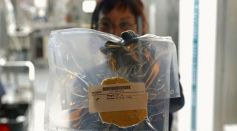Tags: Lab grown meat

Lab-Grown Meat Approvals Set to Transform UK Food Market: When Can Consumers Expect Cultured Meat to Arrive?

Lab-Grown Meat, Insects and Burgers Could Be Staple Meals by 2054

Lab-Grown Meat Approved for Production and Sale in the US For the First Time

Lab-Grown Mammoth Flesh Used For Making Prehistoric Meatball; Is It Edible?

Lab-Grown Meat: How Ready Are We to Accept, Add This to Our Regular Meal?

US Site's Large-Scale Facility to Produce 15,000 Tons of Lab-Grown Meat Per Year Without Animal Slaughter Will Be Finished Later This Year

New Lab-Grown Meat Production Facility in California Brings Cell-Based Food Closer to Reality

Lab-Grown Meat: A Good or Bad Development for Everyone?

Want a Space Steak? Slaughter-Free Meat Successfully Cultured in International Space Station
Lab-Grown Meat, Will it Benefit the Environment?
Edible Insects Substitute For Livestock Meat Could Cut Greenhouse Gasses Emissions
Most Popular

Ancient Hotspot Found to Have Created Great Lakes 300 Million Years Ago

Mysterious Structures Discovered Beneath the Pacific Ocean, Puzzle Scientists

Health Benefits of Drinking Hot Chocolate

Largest Known Volcanic Aquifer Discovered Beneath Oregon's Cascades





